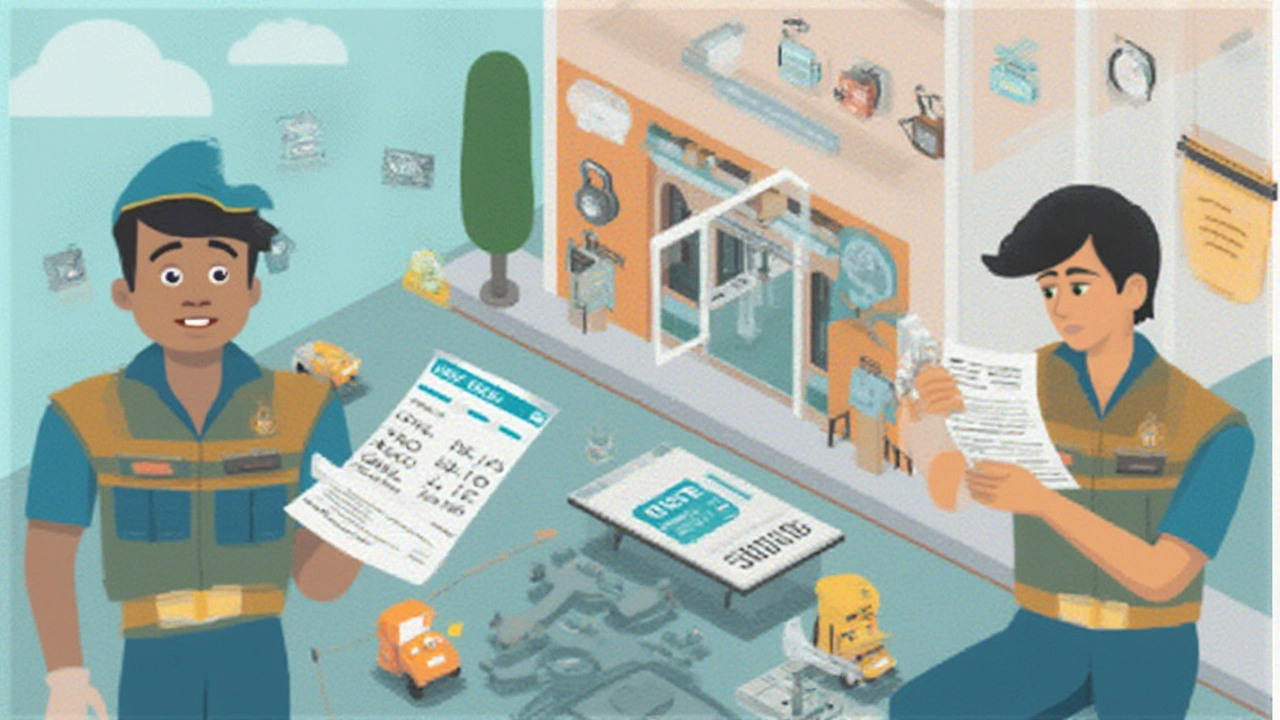
Locked out late at night? Those frantic few minutes waiting for a locksmith can feel like forever. By the time you’re handed a new key or your door swings open, you might be wondering if you just paid too much for a few minutes’ work. Turns out, locksmith pricing in the US isn’t pulled out of thin air, and there’s more going on than you might think.
What Affects Locksmith Costs in the US?
The price you’ll pay for a locksmith isn’t just about unlocking doors. Think about timing. Nighttime, weekends, or a holiday? Expect to pay more. According to data from HomeAdvisor in 2025, standard service calls usually cost anywhere from $65 to $125 for residential work. Need something quick at 3 a.m.? That fee could shoot up by 50-100%. Emergency, off-hours work is always pricier, mainly because locksmiths have to be on call and ready to drive to your place even if it’s snowing at midnight. Some folks get tripped up thinking all tasks will cost the same, but pricing breaks down by the service: unlocking a standard interior door is often cheaper than fixing a broken key in a high-security deadbolt.
Location matters almost as much as timing. If you live downtown in a big city, expect to pay more—sometimes up to 30% higher—because of heavier traffic, difficult parking, and general business costs. In smaller towns or rural areas, prices drop somewhat, but there’s often a mileage or travel fee. For example, in places like San Francisco, the average cost for getting into your house is around $150, but in rural Indiana, you might get in for $70 plus a modest $20 travel charge.
Then there’s the kind of lock you have. Deadbolts, electronic smart locks, mortise locks, and car locks all have different price tags. Smart locks, which are popping up everywhere thanks to increased home automation, can cost upwards of $200–$300 to reprogram or fix. Replacing a standard deadbolt? More like $50–$100 plus hardware. Duplicating a car key for modern vehicles—especially those with transponders or keyless entry—can set you back $125–$350, which surprises a lot of drivers used to the $5 hardware store routines of the past.
There’s also the "rekey vs. replace" factor. Rekeying changes a lock so old keys won’t work. It’s usually cheaper than replacing the whole lock—often $20–$50 per lock for labor (excluding new keys). If you need new locks installed, hardware prices pile on—deadbolt locks can be as little as $15 for a simple model, but high-security locks or smart locks range from $90 up to $300 just for the equipment.
| Service | Average Cost (Standard) | Average Cost (Emergency/After-hours) |
|---|---|---|
| House Lockout | $80–$150 | $150–$300 |
| Car Lockout | $70–$150 | $120–$250 |
| Lock Rekeying | $20–$50 per lock | $40–$100 per lock |
| Lock Installation | $50–$300 (plus hardware) | $100–$400 (plus hardware) |
| Smart Lock Service | $150–$300 | $250–$500 |
| Key Cutting (Standard) | $10–$40 | $30–$80 |
| Key Fob/Transponder Programming | $100–$350 | $200–$500 |
So, it’s not just a one-price-fits-all game. Your final bill is a mix of time, place, lock type, and what kind of fix you need.
Breaking Down Common Locksmith Services and Prices
If you feel blindsided by locksmith prices, it helps to know what’s standard. Everyone knows about the classic house lockout, but locksmiths aren’t just key-wranglers—they do everything from rekeying to repairing busted deadbolts, upgrading you to smart locks, and even complicated master key system installations for businesses.
Let’s talk about the most common request: the simple lockout. In 2025, HomeGuide reports the national average for getting back into your house or car sits between $90 and $150. But this can swing up or down for reasons we already talked about—location, timing, and lock complexity.
Rekeying remains a solid budget-friendly move after a roommate moves out or you lose your keys. Most locksmiths charge a base labor fee, then add $15 to $25 for each lock they rekey. If you have a whole house with several doors—say three entryways each with two locks—you could be looking at $150 or more for a full rekey, plus the price of new keys (around $4–$8 each).
Lock replacements or fresh installations involve more muscle and more cash. Deadbolt replacements, for example, require old hardware to be removed then new locks fitted and tested. Labor averages $50–$300 depending on the brand and strength of the lock—cheap models come in lowest, while something like a Medeco high-security deadbolt, which is basically the Fort Knox of home security, can cost $200 just for parts. If you want to upgrade to smart locks, expect installation and setup alone to cost another $100–$200 on top, especially if WiFi or Bluetooth tech is involved. Hey, at least you’ll have a cool app to unlock your front door.
Now car work, that’s a whole other beast. If you accidentally locked your keys in your car, an experienced locksmith can get you inside without damage for $75 to $150, depending on your make and model. Things shoot up fast if you drive a high-end vehicle with anti-theft systems. Worse, if your car key has a chip or is a fob with programming involved, costs can hit $350 in a blink. In 2025, with keyless entry becoming normal, simple metal keys are a thing of the past.
You might not have realized, but locksmiths can actually duplicate a key or even make you a new one from scratch if you lost yours—no original needed. For home keys it’s a cheap job, usually $10–$40. For transponder or remote car keys though, the chip costs, plus specialized equipment and tech know-how, push the bill far higher, sometimes rivaling the price you’d pay at a dealer (but often faster and with less hassle).
There’s a bunch of specialty services too. Safe opening, mailbox lock changes, antique lock repairs, and security upgrades all cost differently. Safe work feels like a James Bond job, but for a small home safe, expect $100–$300, and much more if you’re dealing with a massive gun safe or a commercial vault. On top of that, replacing the lock on your mailbox usually runs $65–$120.
So, what do all these services have in common? They’re practically priced by labor time, complexity, and risk. If you want to cut costs, stick to standard locks, ask for rekeying instead of replacement when possible, and avoid after-hours calls unless your situation is really urgent.

Money-Saving Tips: Getting the Best Value
No shade to locksmiths, but nobody loves a surprise bill. Here are some down-to-earth ways to keep *locksmith cost* under control without skimping on security.
- Ask for an upfront quote. Legit locksmiths will usually give you an estimate over the phone. Avoid companies that can’t or won’t commit to at least a range, as shady operators love to pile on mystery charges.
- Skip the big directories and do a quick Google Maps search. Local, family-run locksmiths (read the reviews) often charge less and work faster than national call centers.
- Don’t wait until it’s an emergency. If you know your lock is sticky, wobbly, or the key’s bending, sort it during normal hours. After-hours and emergency rates are typically double.
- Rekey rather than replace. If your locks are solid but you’re worried about lost keys (say, after buying a house), ask about rekeying instead of a full replacement. Much cheaper, same peace of mind.
- Double-check credentials. The Associated Locksmiths of America (ALOA) offers certification and a directory. Knowing your locksmith is certified means better odds of honest, skilled work.
- If you’re handy, some deadbolts and smart locks are designed for DIY installation. Just be sure to follow instructions to avoid damaging your door.
- Keep a spare key in a safe spot. It’s obvious, but it works. Hide-a-key boxes have come a long way—you can now find biometric, app-controlled versions.
One red flag: Locksmith scams have spiked. If you call a "$15 service call" ad, expect bait-and-switch tactics meant to fleece you once on site. Always be skeptical of prices that seem unrealistically cheap. Some state attorney general offices have warned about fly-by-night outfits with generic van wraps and no local business address.
If you own a business, a master key system can pay off big time by letting you control access more easily for employees, but this upgrade will need a bigger upfront investment—around $150–$400 per door for setup, plus special keys.
For renters, check if your landlord covers lock problems first. Some states legally require landlords to handle lock changes or rekeying between tenants for security, so you might get the service covered for free when moving into an apartment.
Locksmith Industry Trends and What to Watch Out For in 2025
The locksmith industry, like everything else, keeps evolving. Electronic and smart locks are everywhere, especially with Amazon, Google, and Yale all fighting for space in the home security world. The average price of fixing or installing smart locks has almost doubled since 2019 because technicians need new skills and pricey gadgets to diagnose or program them. The typical locksmith now carries Bluetooth dongles and fingerprint scanners alongside traditional lock picks in their van.
Cities are seeing more demand for car key programming, too. Since 2020, the number of cars with traditional keys has dropped, and now about 70% of cars on the road in big US cities use some form of chip-embedded key or remote fob. Dealerships charge sky-high prices—sometimes $500+ for new fobs—so independent locksmiths are filling the gap with faster, usually cheaper, service. Expect demand for this to keep growing.
On the downside, more internet-connected locks means more calls about glitches, software bugs, and even hackers. Some unlucky folks have been locked out by their own smart home just because the WiFi dropped out or an app update glitched. Locksmiths are quickly turning into smartphone techs as much as mechanical fixers.
Security concerns keep pushing up demand for high-security locks, pick-resistant cylinders, and bump-proof deadbolts. In 2024 and 2025, reports of lock bumping (where thieves use a filed-down key to "bump" open certain locks) prompted a spike in requests for specialized security locks. According to a 2024 Consumer Reports study, about 20% of household break-ins exploited basic deadbolts that hadn’t been updated in a decade. Upgrading old locks may cost more upfront, but it’s way cheaper than losing your stuff.
And watch the licensing laws—states like Texas, California, and New Jersey strictly regulate who can work as a locksmith, while others are laxer. Always ask if your pro has a current license and insurance, especially for pricey work like safe cracking or complicated car jobs.
In the end, the best way to keep your costs down is to do your homework, avoid last-minute emergencies, and remember that paying for good security up front is cheaper than dealing with a break-in or scam afterward. The US locksmith scene is changing fast, but one thing doesn’t: everyone wants to feel safe at home—and nobody wants to pay twice as much as their neighbor for the same lockout rescue.
